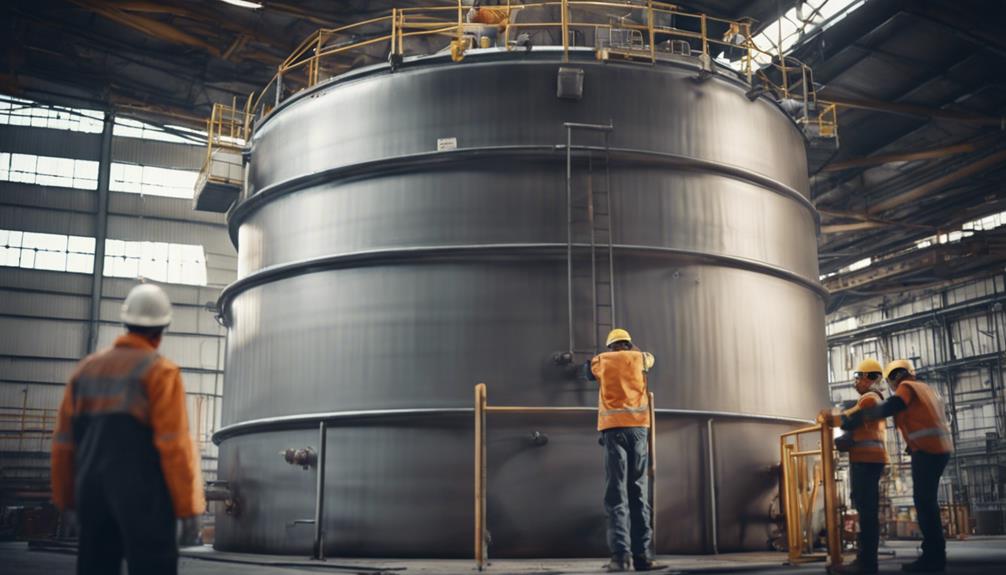Enhance industrial efficiency and safety with durable steel storage tanks. These tanks offer unparalleled reliability and longevity, making them a cost-effective choice for businesses. Consider your industrial requirements, storage capacity, and substance compatibility before purchasing. Adhere to proper installation techniques and maintenance to guarantee safety and longevity. Steel tanks meet stringent safety measures, industry standards, and environmental regulations, minimizing risks and enhancing efficiency. Discover how innovative insulation and temperature control solutions optimize operational processes. Explore customization options to meet diverse industry needs effectively. Comparative advantages of steel tanks showcase their durability and versatility. Exciting future innovations in steel tank technology revolutionize industrial storage solutions for enhanced performance.
Key Takeaways
- Stainless steel tanks ensure unparalleled durability and reliability.
- Enhance safety with meticulous manufacturing processes.
- Boost efficiency by customizing tanks to meet industry needs.
- Insulation options optimize temperature control for stored liquids.
- Comply with standards to ensure safety and operational efficiency.
Benefits of Steel Storage Tanks
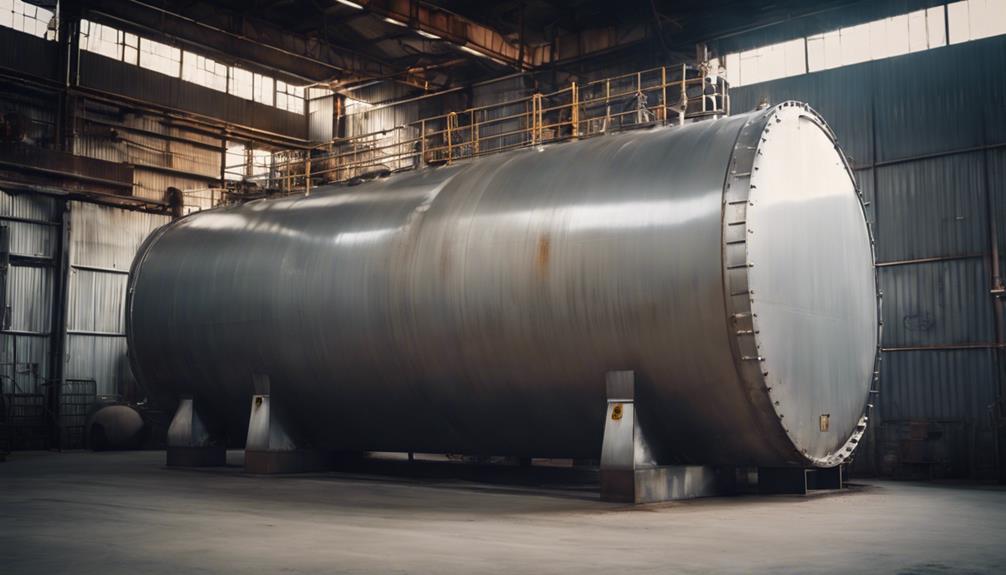
Steel storage tanks stand out as a superior choice due to their unparalleled durability and reliability, surpassing the performance of plastic or fiberglass alternatives. Steel Tank Manufacturers utilize a meticulous water tank manufacturing process to guarantee the highest quality standards are met.
These tanks are not only robust but also versatile, making them ideal for various applications, including storing water, chemicals, and petroleum products. Industries such as cargo terminals benefit greatly from the use of steel tanks due to their strength and ability to withstand harsh environments.
The structural integrity of steel tanks guarantees the safety of stored liquids, reducing the risk of leaks and spills that could lead to accidents or environmental hazards. Additionally, their long lifespan and minimal maintenance requirements make them a cost-effective choice for businesses looking to invest in reliable storage solutions that prioritize efficiency and safety.
Considerations Before Purchasing
Before investing in a steel storage tank, thorough evaluation of your industrial requirements and environmental conditions is essential to guarantee peak functionality and longevity.
When considering the purchase of a steel storage tank for industry, it is important to assess the storage capacity needed for your specific operations, making sure that the tank can effectively meet your requirements.
Additionally, evaluating the environmental conditions where the tank will be situated is crucial in selecting a steel tank that can withstand corrosive substances and harsh weather conditions. It is important to factor in the type of liquid to be stored to determine compatibility with the steel tank and ensure the integrity of the stored substance.
Reviewing the available installation space is also key to choosing a suitable steel tank that fits the designated area and allows for efficient operation.
Moreover, reviewing the safety features and compliance standards of the steel tank from a reputable water tank manufacturing company is necessary to ensure regulatory requirements are met and risks in your industry are minimized.
Installation and Maintenance Tips
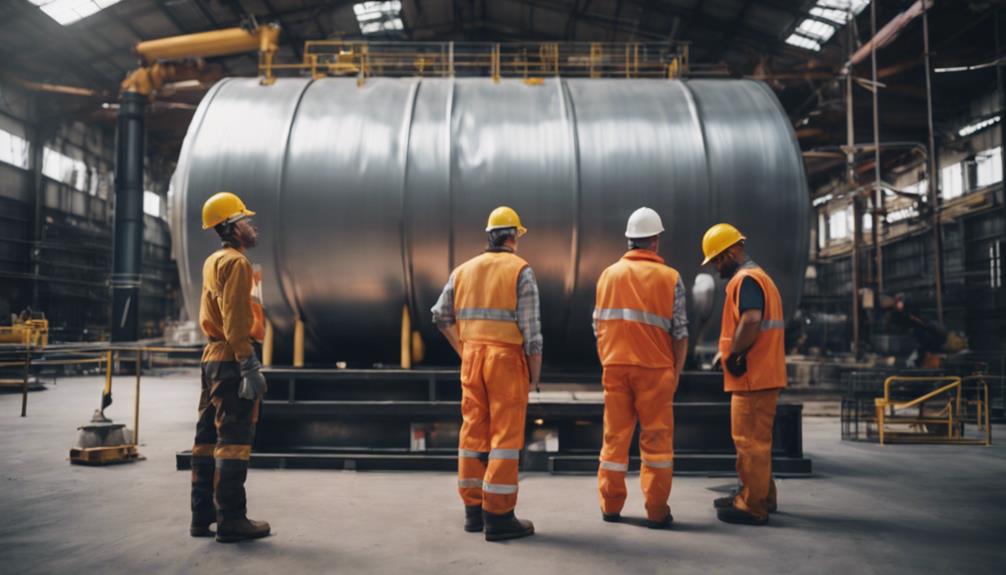
To guarantee the longevity and peak performance of steel storage tanks, it is essential to adhere to proper installation techniques and maintenance routines. Regular inspections and maintenance schedules play a vital role in ensuring the best functioning and durability of these tanks. Proper installation practices, such as thorough foundation preparation and secure anchoring, are fundamental for maintaining stability and safety.
Following the manufacturer’s guidelines for maintenance procedures and schedules is important in preventing potential issues and ensuring compliance with industry standards. Implementing corrosion prevention measures, like coatings and cathodic protection systems, can greatly extend the lifespan of steel storage tanks. These measures are essential for preserving the structural integrity of the tanks and preventing leaks or other potential hazards.
Moreover, providing thorough training to personnel on safety protocols, leak detection methods, and emergency response procedures is key to maintaining a secure environment around steel storage tanks. By prioritizing installation best practices and implementing regular maintenance routines, industries can optimize the efficiency and safety of their steel storage tank systems.
Safety Measures and Compliance Standards
Upholding stringent safety measures and compliance standards is vital in the design and operation of steel storage tanks. Steel storage tanks are meticulously engineered to meet industry standards and regulatory requirements, prioritizing safety and environmental protection. By minimizing the risk of leaks, spills, and accidents, these tanks offer a secure and reliable storage solution for various industries.
The safety measures integrated into steel tanks play an essential role in mitigating potential risks and safeguarding the environment from harm. Compliance with environmental and safety regulations is a fundamental feature of steel storage tanks, ensuring that operations adhere to legal requirements and best practices. Additionally, the hygienic and sterile environment provided by steel tanks not only enhances operational efficiency but also upholds safety standards in industrial processes. Overall, steel storage tanks are designed to promote safety, compliance, and environmental protection, making them a preferred choice for many industries.
Environmental Impact and Sustainability
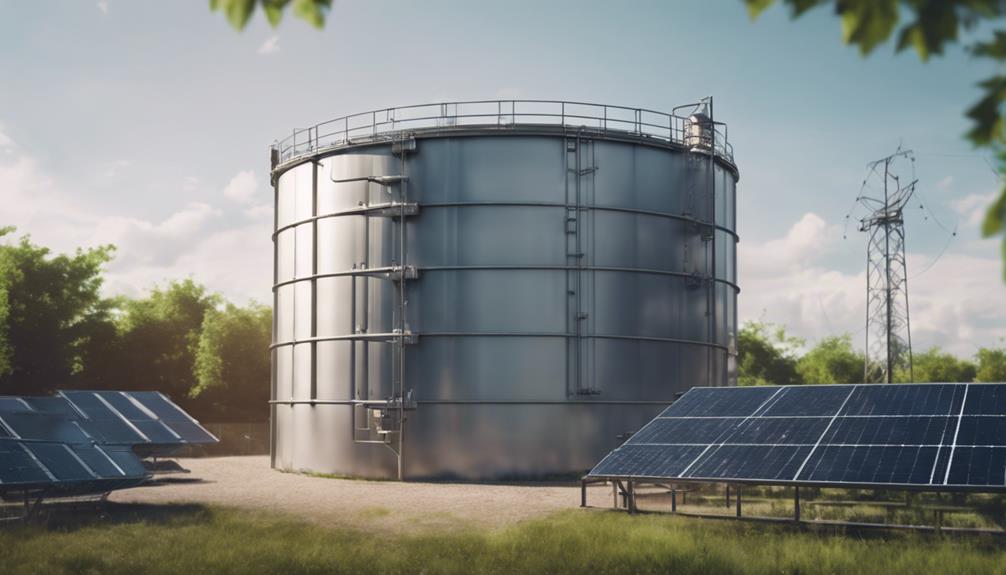
In the domain of steel storage tanks, the environmental impact and sustainability of stainless steel tanks are significant aspects that highlight their importance in modern industrial applications. Stainless steel tanks are made from 60% recycled material, contributing to environmental sustainability. The production processes of these tanks incorporate advanced techniques that not only guarantee durability and safety but also enhance sustainability. Additionally, stainless steel tanks maintain a fresh and visually appealing look even after years of use, which promotes a positive environmental impact by reducing the need for frequent replacements.
In addition, stainless steel tanks offer longevity and versatility in various industries due to their resistance to weather conditions, UV rays, and extreme temperatures. This durability reduces the frequency of replacements, further minimizing the environmental impact. Moreover, these tanks prevent issues like calcium leaching and mold growth, ensuring water hygiene and preventing contamination effectively. Overall, the environmental benefits and sustainable features of stainless steel tanks make them a reliable and eco-friendly choice for industrial storage needs.
Enhancing Efficiency With Steel Tanks
Enhancing efficiency through the use of steel tanks provides industrial operations with a durable and reliable storage solution that surpasses alternative materials. Steel tanks offer superior strength and longevity, outlasting plastic and fiberglass tanks in industrial settings. Their customizable nature in size, shape, and features enables them to efficiently meet diverse storage needs, ensuring ideal utilization of available space. The minimized risk of leaks and spills associated with steel storage tanks enhances operational safety and reliability, essential for industries handling hazardous materials.
Moreover, the minimal maintenance requirements of steel tanks over their lifespan translate to lower operational costs and long-term savings for businesses. The hygienic and sterile environment steel tanks provide is particularly beneficial for industries involved in UHT processing, safeguarding the safety and quality of liquid products stored within them. By choosing steel tanks, industries can streamline their operations, reduce downtime, and enhance overall efficiency while maintaining a secure and sustainable storage solution.
Insulation and Heat Transfer Solutions
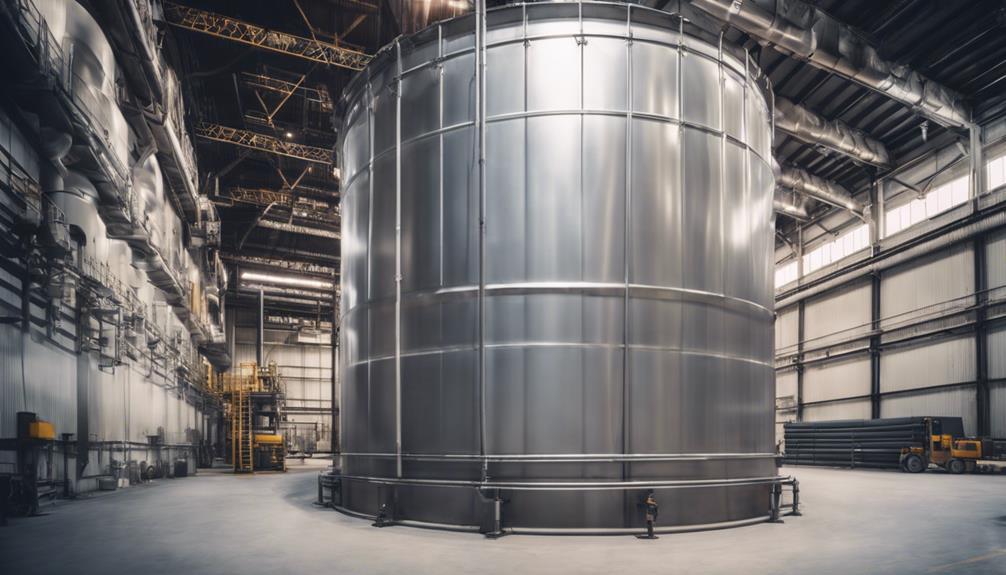
Implementing innovative insulation techniques in stainless steel tanks maximizes heat transfer efficiency, guaranteeing precise temperature control for a variety of industrial applications. Double-walled stainless steel tanks are particularly effective in this regard, offering superior insulation properties that help reduce energy costs by preventing water from freezing in cold environments.
The insulated layers within these tanks play a vital role in maintaining ideal temperatures for stored liquids, safeguarding product integrity and quality throughout the storage period. Industries requiring precise thermal management find stainless steel tanks with insulation to be ideal, as they facilitate efficient temperature control. By minimizing heat transfer, these tanks preserve the temperature of sensitive liquids, contributing to enhanced operational efficiency.
The reliable solution provided by insulated stainless steel tanks ensures consistent temperature maintenance, thereby optimizing production processes and meeting the stringent requirements of various industrial settings.
Customization Options for Your Industry
Steel storage tanks offer a range of customization options tailored to meet the specific requirements of various industries efficiently. These customization options include the ability to adjust the size, shape, and additional features such as insulation to cater to different industry storage needs effectively.
Whether storing water, chemicals, or petroleum products, the flexibility in customization guarantees that the integrity and performance of the substances remain intact. The adaptability of steel tanks to diverse industrial applications provides a versatile solution for storage requirements.
Additionally, the design of steel tanks can be optimized to handle heavy loads, ensuring durability and reliability in industrial operations. Compared to other materials, customizable steel tanks stand out due to their superior strength and longevity, making them the preferred choice for long-term storage needs in a wide range of industries.
The customization options available for steel storage tanks make them a versatile and reliable storage solution for various industrial applications.
Comparing Steel Tanks to Other Materials
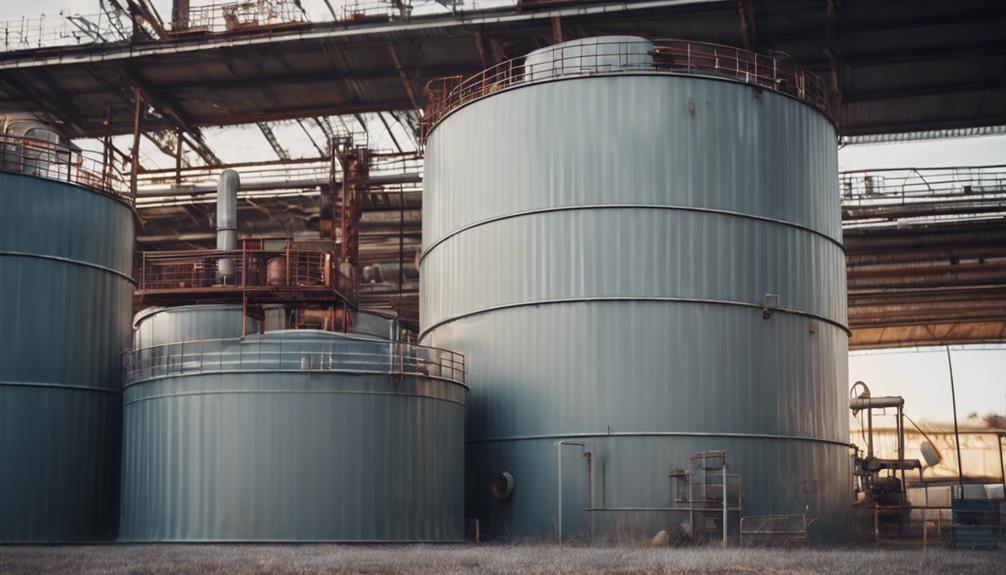
When evaluating storage tank options for industrial applications, it is vital to contemplate the comparative advantages of steel tanks over alternative materials. Steel tanks offer superior durability and reliability compared to plastic or fiberglass tanks. This is due to their high-quality materials and construction, making them ideal for long-term industrial storage needs. Steel tanks excel in withstanding harsh environmental conditions and corrosive substances effectively.
Moreover, steel tanks are versatile in storing various liquids such as water, chemicals, and petroleum products while maintaining integrity and performance with different substances. Their customization options in size, shape, and features like insulation make them adaptable for diverse industrial applications. Additionally, steel storage tanks are designed to meet industry standards and regulatory requirements. This minimizes the risk of leaks, spills, and accidents, ensuring safety and compliance in industrial settings.
Future Innovations in Steel Tank Technology
Advancements in steel tank technology are revolutionizing industrial storage solutions through innovative coatings and smart monitoring systems. The use of advanced coatings, such as epoxy linings, enhances the corrosion resistance of steel tanks, ensuring longevity and durability. Additionally, the incorporation of smart technology allows for real-time monitoring and maintenance alerts, enabling proactive measures to be taken promptly.
Future innovations in steel tank technology also include the integration of IoT sensors for predictive maintenance and performance optimization. By leveraging data analytics and connectivity, operators can anticipate maintenance needs and optimize the tank’s efficiency. Furthermore, the development of self-healing materials presents a promising solution to repair minor damages autonomously, thereby extending the tank’s lifespan and reducing maintenance costs.
Furthermore, the implementation of automation in steel tanks streamlines filling, draining, and cleaning processes, enhancing operational efficiency and safety. These advancements signify a shift towards more intelligent and efficient industrial storage solutions, setting new standards for the future of steel tank technology.
Frequently Asked Questions
What Are the Benefits of a Steel Tank?
Steel tanks provide unparalleled durability, reliability, and versatility for storing liquids like water, chemicals, and petroleum. They guarantee safety and compliance, minimize risks of leaks, and offer cost-effectiveness through low maintenance requirements, meeting industry standards and regulations.
What Are the Safety Measures for Storage Tanks?
Implement regular inspections, maintenance, safety protocols, and training for workers to guarantee storage tank safety. Utilize warning signs, labels, and a thorough safety plan to mitigate hazards and enhance workplace safety and regulatory compliance.
What Is the Purpose of Storage Tanks?
Storage tanks serve to securely store various liquids, including water, chemicals, and petroleum products in industrial settings. They help maintain product integrity, extend shelf life, and facilitate efficient distribution. These tanks play a crucial role in enhancing production processes and ensuring substance preservation.
What Are Steel Tanks Used For?
Steel tanks are utilized across industries for storing liquids such as water, chemicals, and petroleum products. Offering superior strength, durability, and customization options, these tanks guarantee efficient long-term storage, handling heavy loads effectively while minimizing risks.
Conclusion
To sum up, steel storage tanks offer numerous benefits for industries when it comes to efficiency, safety, and sustainability.
It is crucial to carefully consider factors such as installation, maintenance, safety measures, and compliance standards before purchasing a steel tank.
With advancements in technology, customization options, and insulation solutions, steel tanks continue to be a reliable choice for storing various liquids and materials in a cost-effective and environmentally friendly manner.

